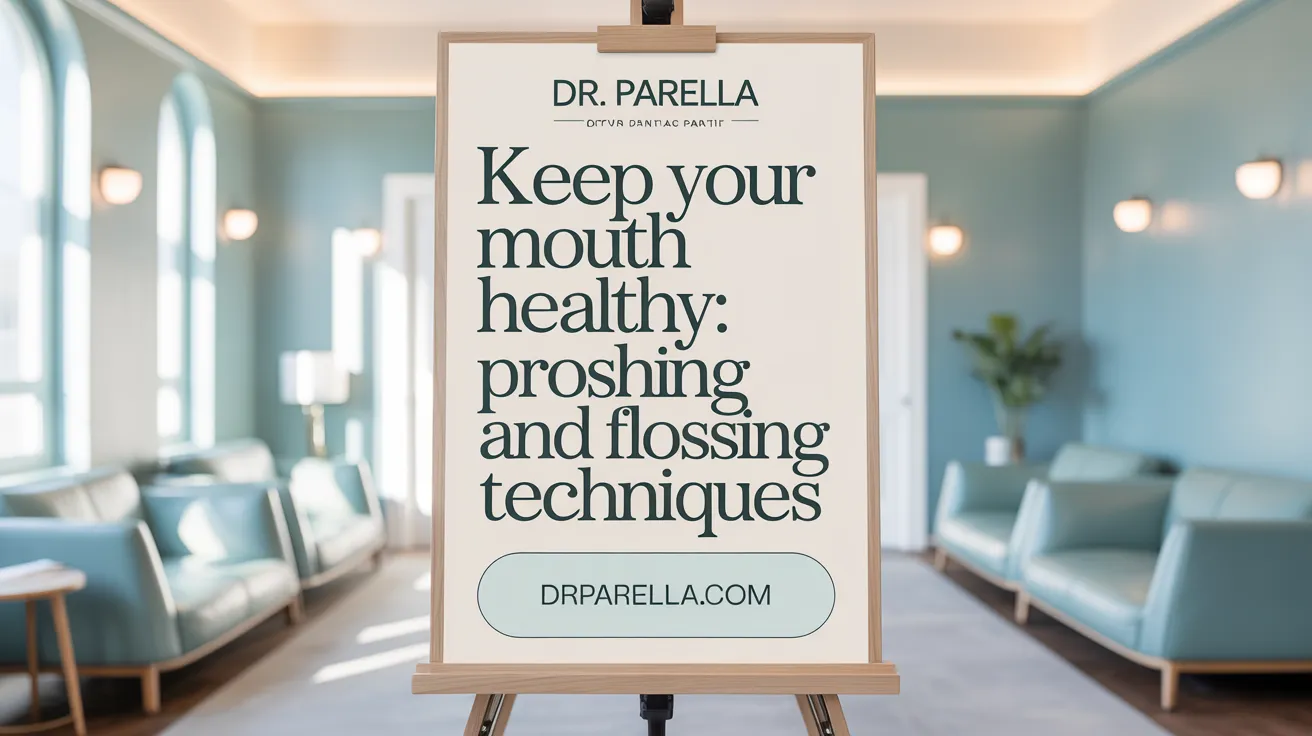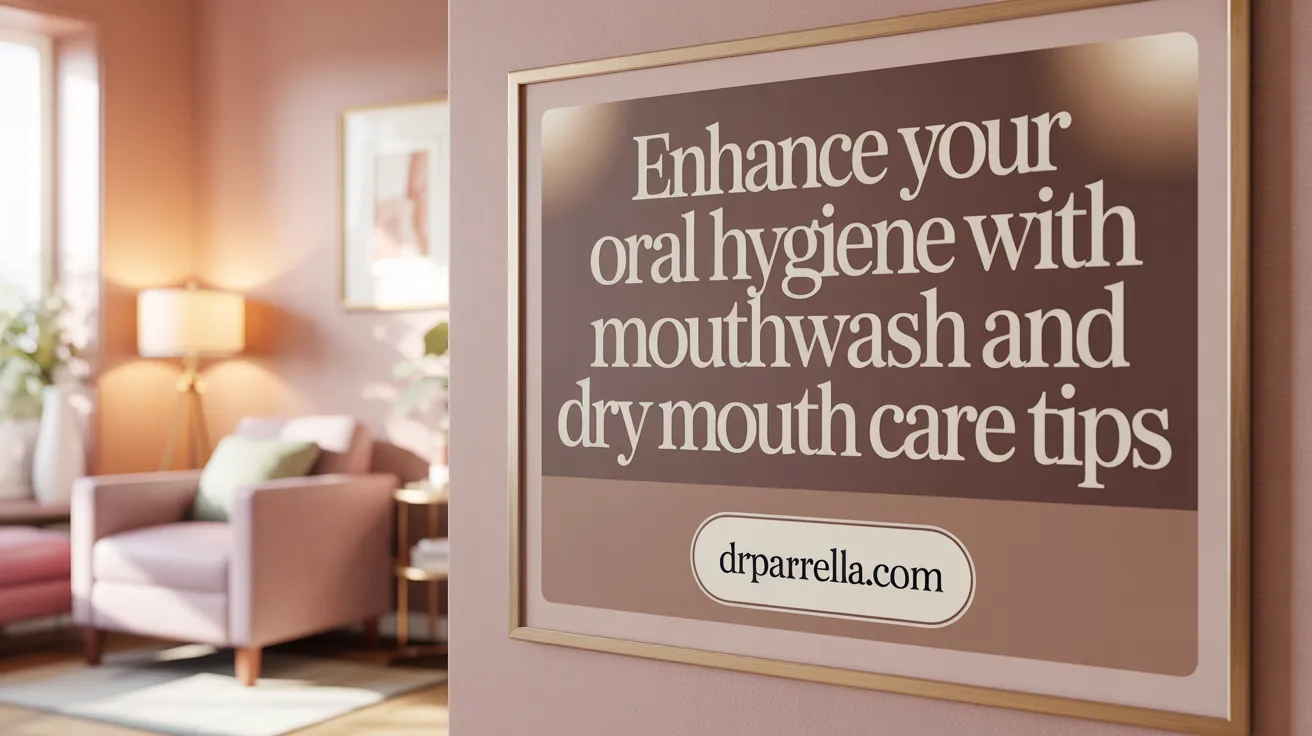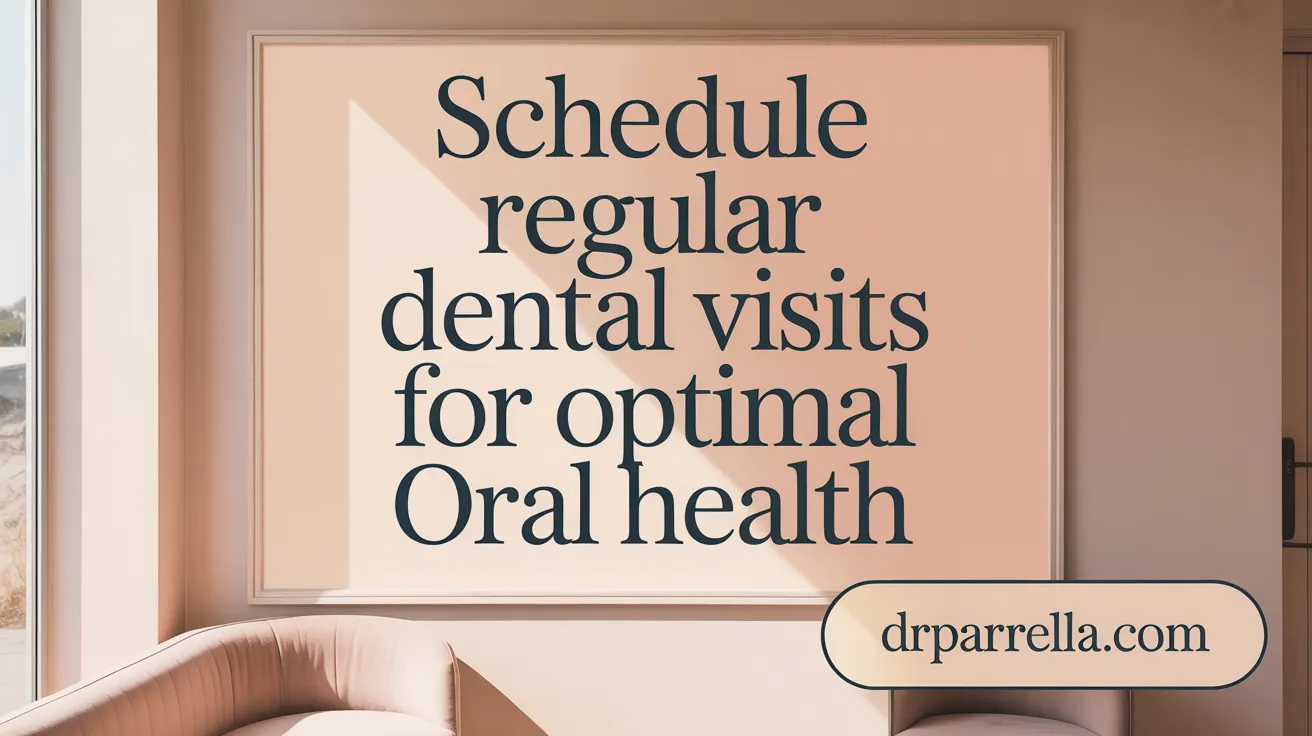The Importance of Daily Oral Care Rituals
Understanding the significance of daily oral hygiene
Daily oral care plays a crucial role in preventing common dental problems such as tooth decay and gum disease. By brushing twice daily with fluoride toothpaste and flossing once a day, families can effectively remove plaque and bacteria that lead to dental issues.
How daily habits impact overall health
Good oral hygiene does more than keep smiles bright; it significantly reduces the risk of systemic conditions like heart disease and diabetes. Maintaining healthy teeth and gums supports your body's overall wellbeing and helps avoid costly dental treatments.
Support from your family dental practice
At a family-run dental clinic, we emphasize compassionate care and personalized guidance. We provide clear advice tailored to your needs, helping every family member establish and maintain effective daily oral care routines that promote lifelong dental health.
Effective Brushing and Flossing Techniques

How often should you brush your teeth and for how long?
Brushing your teeth twice daily, ideally after breakfast and before bedtime, for about two minutes each time is recommended to effectively remove plaque and bacteria. This routine helps prevent tooth decay and gum disease, ensuring a clean and healthy mouth.
What type of toothpaste and toothbrush should be used?
Using fluoride toothpaste with at least 1,350 ppm fluoride strengthens the enamel and protects teeth against decay. A soft-bristled toothbrush is recommended to avoid damaging gums. Position the brush at a 45-degree angle to the gumline, using gentle, short strokes to clean the teeth and along the gumline thoroughly.
Why is flossing important and how should it be done?
Daily flossing removes plaque and food debris from tight spaces between teeth and beneath the gumline where a toothbrush cannot reach. Use about 18 inches of dental floss, wrapping it into a 'C' shape around each tooth, and move it up and down gently to clean effectively without harming the gums.
Should the tongue be cleaned and why?
Yes, brushing or scraping the tongue daily helps remove bacteria that cause bad breath and contribute to oral health problems. Incorporating tongue cleaning into your routine promotes fresher breath and a healthier oral environment.
Maintaining these brushing and flossing techniques fosters healthy teeth and gums, reduces the risk of oral diseases, and supports oral hygiene and systemic health link.
Incorporating Mouthwash and Managing Dry Mouth

Should mouthwash be used as part of daily oral care?
Using an antibacterial mouthwash use, alcohol-free mouthwash advantages, mouthwash use daily, or specifically an alcohol-free fluoride mouthwash daily after brushing and flossing offers multiple benefits. It helps reduce plaque buildup effects and harmful bacteria that brushing alone might miss, freshens breath, and strengthens tooth enamel through fluoride. Alcohol-free formulas are especially important as they help prevent drying out the mouth, making them a gentle yet effective addition to your oral hygiene routine.
What causes dry mouth and how does it affect oral health?
Dry mouth, medically called xerostomia, commonly results from certain medications or health conditions that reduce saliva production. Saliva is crucial as it neutralizes acids and clears food particles from teeth. Without adequate saliva, the risk of tooth decay prevention and oral infections rises significantly, as the mouth becomes a less protective environment for teeth and gums.
How can dry mouth be managed at home?
Managing dry mouth involves simple but important steps. Sipping water throughout the day keeps the mouth moist and aids natural cleansing. Avoiding tobacco products for oral health and alcohol, both of which can worsen dryness, supports oral health. Chewing sugar-free gum can stimulate saliva flow naturally. When needed, using artificial saliva substitutes can provide relief and help maintain a healthy oral environment.
Incorporating these strategies into your daily routine ensures a comfortable mouth environment and helps protect against common dental issues linked to dry mouth. For more on the oral hygiene and systemic health link, maintaining good oral care is essential for overall wellbeing.
Nutrition and Lifestyle Habits for Healthy Teeth and Gums

What dietary habits support oral health?
Eating a balanced diet rich in calcium, phosphorus, vitamin C, and fiber is vital for strong teeth and gums. Foods such as dairy products (milk, yogurt, cheese), leafy green vegetables, canned fish, and a variety of fruits and vegetables provide essential nutrients that help maintain and repair oral tissues. For more information, see Oral Health Tips for Adults.
How does sugar intake affect oral health?
Consuming high amounts of sugary and acidic foods or drinks promotes plaque buildup effects and acid production in the mouth. These acids erode the tooth enamel, increasing the risk of cavities and gum disease. Limiting sugary snacks and beverages can substantially reduce these risks and help maintain a healthier smile. Learn more about Preventing tooth decay.
Why should tobacco products and excessive alcohol be avoided?
Tobacco use and excessive alcohol consumption have harmful effects on oral health. They increase the chances of developing gum disease and oral cancers by impairing the immune system and causing tissue damage. Additionally, tobacco slows healing in the mouth, making infections and gum problems harder to manage. See more about Avoiding tobacco products for oral health and Avoiding tobacco for oral health.
What other lifestyle habits affect dental health?
Drinking fluoridated tap water helps strengthen tooth enamel and protect against decay. Avoiding oral piercings reduces risks of tooth fractures, gum recession, and other dental injuries. Also, refrain from using your teeth as tools (like opening bottles) to prevent enamel erosion and damage. For advice on Fluoride toothpaste uses and Oral health and overall health, see these resources.
Adopting these nutrition and lifestyle habits supports long-term oral health, preserving a healthy smile and preventing costly dental problems. Learn more about Maintaining oral health and Good oral hygiene habits.
Routine Dental Visits and Professional Care Importance

How often should you visit the dentist for checkups and cleanings?
Most individuals are advised to see their dentist every six months for routine dental examinations and cleanings. This semiannual schedule helps maintain oral health by monitoring for any developing issues. However, people with higher risk factors—such as those with gum disease, dry mouth, or chronic health conditions—may require more frequent visits tailored to their needs.
Why are professional cleanings necessary if you brush and floss daily?
Even with diligent brushing teeth twice daily and daily flossing, hardened plaque called tartar can accumulate, which cannot be removed by at-home oral hygiene. Professional cleanings conducted by dental hygienists or dentists effectively remove this tartar buildup. This process prevents the progression of gum disease and tooth decay, supporting long-term dental health.
What is the importance of early detection in dental care?
Regular dental visits allow for early identification of oral health problems such as cavities, gum disease, and oral cancer. Early detection enables timely treatment, which improves outcomes, reduces the complexity and cost of care, and helps avoid serious complications including tooth loss.
How is dental care tailored to individual risk?
Dental professionals assess each patient’s risk factors—including medical history, lifestyle habits, and oral health status—to personalize the frequency of visits and preventive measures. Education on proper hygiene techniques, dietary advice, and risk reduction strategies are provided to support optimal oral health.
Routine dental care and professional cleanings are essential components of maintaining healthy teeth and gums. They complement daily oral hygiene tips and play a critical role in preventing and managing oral diseases as well as supporting the oral hygiene and systemic health link.
Special Considerations for Different Life Stages and Conditions
How can good oral habits be instilled in children?
Instilling good oral habits in children involves making brushing fun and engaging to encourage consistent practice. Parents should supervise or assist with brushing until children are at least 7 years old to ensure effective cleaning. Introducing kids to dental checkups early helps reduce anxiety and builds a positive attitude toward oral care, establishing healthy routines that last a lifetime.
What special oral health considerations exist during pregnancy?
Pregnancy brings hormonal changes that increase the risk of cavities and gum disease. Pregnant women should maintain rigorous oral hygiene best practices by brushing twice daily with fluoride toothpaste and flossing daily. Regular dental visits are essential for monitoring oral health and managing issues that could affect both mother and baby, such as pregnancy gingivitis.
What challenges do older adults face in maintaining oral health?
Older adults often face challenges like dry mouth due to medications, receding gums, and reduced manual dexterity. Using electric toothbrushes or toothbrushes with larger handles can improve brushing ability. Interdental cleaning aids help compensate for decreased dexterity, and proper denture care is crucial to prevent discomfort and oral infections.
How do chronic diseases affect oral health?
Chronic diseases such as diabetes, arthritis, and HIV/AIDS increase the risk of gum disease and oral infections by impairing the body's ability to fight bacteria and heal. Managing these conditions effectively while maintaining strict oral hygiene routines, including brushing, flossing, and regular dental checkups, helps prevent oral complications and supports overall health.
Recognizing Early Warning Signs and Prompt Action
What are the early signs of gum disease or dental problems?
Early signs often include red, swollen, or bleeding gums, which indicate gingivitis — a mild, reversible form of gum disease. Persistent bad breath can signal bacterial overgrowth, while gum recession and loose teeth may suggest advancing periodontal disease. Additional symptoms to watch for are mouth sores, toothache, and jaw swelling, which can indicate infection or decay needing immediate attention.
Why is it important to seek prompt dental care upon noticing symptoms?
Prompt dental care is critical because early treatment can halt progression from gingivitis to periodontitis. Timely intervention prevents tooth loss and costly restorative procedures such as crowns and bridges treatments. Moreover, maintaining oral health protects overall well-being, as untreated gum disease has been linked to systemic conditions like heart disease and diabetes (oral hygiene and systemic health link).
When should you seek professional dental care?
If you notice any above symptoms—persistent redness, bleeding gums, bad breath, or discomfort—schedule a dental exam promptly. Regular dental visits, ideally every six months, enable early detection of dental issues before symptoms worsen.
Benefits of early intervention
Early intervention means less invasive treatments, reduced pain and discomfort, better preservation of natural teeth, and lowered risk for complications. It also supports long-term oral health and helps prevent associated systemic health problems (oral hygiene best practices.
Being aware of your oral health changes and responding quickly with professional care is essential for a healthy smile and overall wellness.
Maintaining Consistency for Lifetime Oral Health
Daily Habits That Build Strong Oral Health
Maintaining healthy teeth and gums starts with simple daily habits. Brushing teeth twice a day for two minutes with fluoride toothpaste effectively removes plaque and protects against decay and gum disease. Flossing once daily reaches areas between teeth where brushes can't, reducing the risk of cavities and gum infections. Including gentle tongue cleaning helps eliminate bacteria that cause bad breath. Using an alcohol-free antibacterial mouthwash can further reduce harmful bacteria and freshen breath. Limiting sugary snacks and drinks, staying hydrated, and avoiding tobacco products support these routines for optimal oral well-being.
The Benefits of a Consistent Oral Care Routine
Consistent oral hygiene over time leads to a brighter, healthier smile and fresher breath. It lowers the chances of developing cavities, gingivitis, and periodontitis, helping preserve natural teeth for life. Good oral care also reduces the need for costly and invasive dental treatments. Importantly, strong oral health is linked to overall wellbeing, potentially lowering risks for heart disease, stroke, diabetes, and certain cancers.
Personalize Your Dental Care Journey
Everyone's oral health needs are unique. Regular dental visits allow professionals to offer personalized advice and treatment plans tailored to your lifestyle, medical history, and risk factors. Tools like electric toothbrushes or specialized flossing aids may be recommended to optimize your routine. Staying motivated by setting achievable goals and maintaining consistent habits ensures a lifetime of healthy teeth and gums, reinforcing a confident smile for years to come.
